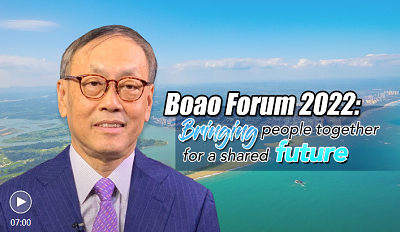
CGTN: According to a report published by the Boao Forum for Asia (BFA), vaccines are unfairly distributed among countries. How do you view the BFA’s call for global coordination to close the immunity gap between developed and developing countries?
Edward Tse: So today a big issue that we’re facing is actually the inequality of the degree of vaccination across different countries. And I think, on a global basis, we need to have a coordinated effort – especially from those countries have gone through the vaccination stages already – to try to help those countries who are not really up to speed with vaccinations yet. So I think the BFA this time is a very good forum for different countries to talk about how do we create this kind of coordinated effort so that more countries can benefit from vaccines that were developed by the more developed countries in the world.
So far, different countries have undertaken different approaches to try to contain the pandemic. I say today the world is still very much in the middle of the pandemic. No country really has fully recovered from the epidemic yet. Therefore, trying to contain and to arrest the pandemic as soon as possible is a very urgent and important imperative for all of us on this earth.
CGTN: How do you view multilateralism and international cooperation under the challenge of the COVID-19 pandemic and economic recession?
Tse: Certainly the pandemic is hitting every country in the world. The virus doesn’t really know national borders. If we put arresting, or the containment, of the pandemic as a priority, it would require the collaboration across all the countries in the world. And this requires multilateralism, it requires countries coming together and view containing or fighting the pandemic as the most important purpose. And then countries need to find a way to work together. So, multilateralism and international collaboration are the key to fight the pandemic in my view.
There are countries able to develop vaccines and able to manufacture vaccines and so on. Many other countries are not able to do so, and therefore the countries who are able to manufacture and develop vaccines ought to find a way to work together (so) that they can supply the vaccines to those countries who really need them and really help them with the whole process of taking the vaccine. And in order to do that, there’s a lot of barriers that countries or companies involved would need to overcome.
For example, number one is tariffs… to what extent tariffs should be maintained when vaccines go from one country to another country. Second is that right now – especially with the new types of vaccines because they were relatively new inventions – therefore there’s a pretty high level of intellectual property rights being assigned to these vaccines. To a lot of other countries who are in a much worse economic situation, it is not possible for them to really mass produce these kinds of vaccines if the IP price is significant.
So perhaps there’s also a way for the countries to work together to try to figure out how can they deal with the intellectual property issues and so on. And of course, there’s also supply chain issues. Even if the countries are willing to supply vaccines from their country to other countries, then how do you actually transport supply and also get the vaccines ready for the receiving site. Those all require coordination across different countries.
So I see the international collaboration and multilateralism, as I mentioned, to the key in really trying to fight against this pandemic and to overcome what we call the um “vaccination divide” across different countries.
CGTN: What kind of opportunities do you think the BFA 2022 will bring to the companies and countries in the Asia-Pacific region and beyond?
Tse: I think the theme for BFA this time is to read each other and to enhance the collaboration of countries as well as companies across the board to try to fight the pandemic as quickly as possible. So, from that end, there’s a lot that we can work together. I think one of the biggest challenges that we’re now facing is the general economic conditions that’s being affected by the pandemic for over two years.
For this time for the BFA, representatives from different countries are gonna be together and perhaps there’s also quite a number of executives of companies. When they come together, they can talk about mutually how they can help each other to try to address some of the issues that they see; for example, on supply chain, in how the post-pandemic economy would look like, and how companies can work together to try to benefit each other in a new world order after the pandemic. The BFA will play a pivotal role for countries as well as companies who will come together during this occasion.
The world is now facing with a lot of uncertainty, a lot of volatility, partly because of the pandemic, partly because of the geopolitical conditions and perhaps in the extreme case with the war in Europe. A lot of governments, a lot of companies are in a very uncertain stage. A forum like BFA is a great opportunity for a country’s delegates and company delegates to come together to really talk it through, despite there may be differences in opinions and perspective on different things, there’s also an opportunity for people to come together and talk about issues that are all relevant, and also people can share the similar point of view. This kind of occasion is really important to try to break down some of the biases or the misinformation that has been generated so far. I hope the BFA would do a good job and try to help people, to bring the people together so that we can create and share a similar vision of a shared future.

